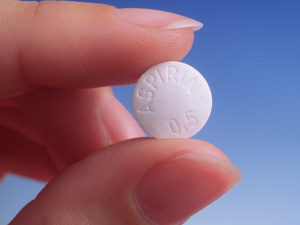
Credit: medscape.com
A new study shows that taking low-dose aspirin regularly may reduce the risk of dying from colorectal cancer by up to 31 percent. The study also found that people who took aspirin on a regular basis had a significantly lower risk of dying from breast, prostate and lung cancers. They also have a lower risk of dying overall.
Yin Cao, an instructor in the Medicine, Clinical and Translational Epidemiology Unit at Massachusetts General Hospital, led the study. She presented her findings at the American Association for Cancer Research meeting in Washington, D.C. on April 2, 2017.
Cao’s researchers looked at two sets of subjects: 86,206 women who participated in the Nurses’ Health Study between 1980 and 2012, and 43,977 men who participated in the Health Professionals Follow-Up Study from 1986 to 2012. They assessed the subjects’ aspirin usage at the beginning of the study period and every two years after that.
Overall, the regular aspirin users’ risk of death from any cause was 7 percent lower for women and 11 percent lower for men. Overall cancer mortality was 7 percent lower for women aspirin users and 15 percent lower for men.
But the largest reduction in cancer mortality was in colorectal cancer — 31 percent in women and 30 percent in men. Additionally, breast and prostate cancer deaths were lower by 11 and 23 percent respectively in the subjects who regularly took low-dose aspirin. (Low-dose aspirin contains 81 mg per tablet versus 325 mg in a regular strength aspirin.)
“These findings suggest that aspirin’s established benefits in cardiovascular disease and colorectal cancer reduction may extend to other common causes of death, including several major cancers,” Cao said.
Low-Dose Aspirin in Disease Prevention
Doctors have long known that low-dose aspirin helps prevent certain cardiovascular events, such as second heart attacks and strokes. More recently, the U.S. Preventive Service Task Force issued a statement recommending low-dose aspirin for the prevention of cardiovascular disease — a much broader category of heart and blood vessel problems that includes heart failure, abnormal heart rhythms and problems with the heart valves.

Aspirin may be the best pain reliever after all
Credit: sarricapt.com
The task force recommended aspirin therapy for patients who are at an increased risk of developing colon cancer as well.
The recommendation is strongest for people who are between the ages of 50 and 59 years and who have a low risk of bleeding (bleeding is a side effect of long-term aspirin use). However, the task force also recommended the use of low-dose aspirin in some patients between the ages of 60 and 69. To get the most benefit, patients should be expected to live at least 10 years and have a 10 percent or greater risk of developing colorectal cancer or heart disease over that period of time.
Aspirin is an NSAID, or nonsteroidal anti-inflammatory drug. And while many Americans take low-dose aspirin for disease prevention, the trend has been away from this old standby for pain relief. But since other NSAIDs such as ibuprofen and naproxen actually increase the risk of heart disease, this may be a good time to rethink what we take for our aches and pains, too.

 Low-Dose Aspirin Lowers Cancer Mortality
Low-Dose Aspirin Lowers Cancer Mortality


 “In Case You Don’t Live Forever” by Ben Platt
“In Case You Don’t Live Forever” by Ben Platt
 Our Monthly Tip: Make an “In Case of Death” File to Ease Loved One’s Grief
Our Monthly Tip: Make an “In Case of Death” File to Ease Loved One’s Grief















